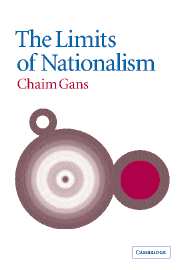Book contents
- Frontmatter
- Contents
- Acknowledgements
- Introduction
- 1 Nationalist ideologies – a normative typology
- 2 The liberal foundations of cultural nationalism
- 3 National self-determination
- 4 Historical rights and homelands
- 5 Nationalism and immigration
- 6 Nationalism, particularism and cosmopolitanism
- 7 Conclusion
- Bibliography
- Index
7 - Conclusion
Published online by Cambridge University Press: 22 September 2009
- Frontmatter
- Contents
- Acknowledgements
- Introduction
- 1 Nationalist ideologies – a normative typology
- 2 The liberal foundations of cultural nationalism
- 3 National self-determination
- 4 Historical rights and homelands
- 5 Nationalism and immigration
- 6 Nationalism, particularism and cosmopolitanism
- 7 Conclusion
- Bibliography
- Index
Summary
A liberal version of cultural nationalism differs from non-liberal versions in two main dimensions. One pertains to the nature of the justifications it can provide for attributing value to national groups, while the other pertains to the normative conclusions that can be drawn from the value ascribed to nations. With regard to the first point, liberalism cannot ascribe value to national groups under the assumption that such groups have normative priority over their individual members. Liberalism can acknowledge the value of national groups only if it is based on fundamental interests of their individual members and if these interests are interests that could in principle be held by all human beings. These interests must take precedence over the value of the national group, and not vice versa, as is the case in non-liberal cultural nationalisms. With respect to the second point, the central values of liberalism are freedom and equality. A liberal version of cultural nationalism is therefore incompatible with chauvinism, which is a form of nationalism that acknowledges the value of one national group only and denies the equal value of all other national groups. Needless to say, liberal nationalism cannot condone methods such as ethnic cleansing or forced assimilation in order to advance the interests of any particular national group. Neither can it support other means which many national groups in fact do practise in the name of self-preservation which do not take into account similar interests that other national groups might have.
- Type
- Chapter
- Information
- The Limits of Nationalism , pp. 169 - 173Publisher: Cambridge University PressPrint publication year: 2003

